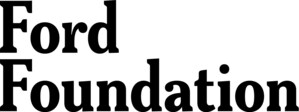Grants will be allocated to The American University in Cairo, The Southern Centre for Inequality Studies at Wits University, Universidad de los Andes, and El Colegio de México, among others
NEW YORK, Oct. 19, 2022 /PRNewswire/ -- Today, the Ford Foundation announced a $13 million commitment that will strengthen economic research centers in the Global South to advance more equitable growth policies and reimagine economic systems. The centers are housed at universities in Latin America, Africa, and Asia, to give local communities an opportunity to help shape the policies and economic systems that directly impact their lives.
This announcement marks the next step in a major philanthropic effort to build a global network of institutions focused on challenging neoliberalism and traditional economic thinking. The dominant economic policies of the past 50 years have left behind impoverished communities around the world and are widely considered to offer insufficient solutions for today's global challenges, such as the climate crisis and rampant wealth inequality within and among countries. The grants announced today will complement an existing network of university centers announced by the Hewlett Foundation and Omidyar Network earlier this year. Those investments established centers at Harvard Kennedy School, Howard University, Massachusetts Institute of Technology, Johns Hopkins University, and Columbia University.
"Unregulated markets have caused some of the principal societal inequities we face today. It is time for markets to serve the interests of all people," said Martín Abregú, Ford Foundation Vice President for International Programs. "While the free market worldview has dominated for decades, the changing global economic context and persistent inequality require us to rethink traditional models. We are pleased to join Hewlett in this initiative to develop a bold vision for the future of global economic systems that will better serve today's society."
The recipients of these grants will go beyond critique to propose real alternatives and develop new frameworks for how governments, markets, and individuals can better relate to meet society's biggest challenges. The centers are housed at The American University in Cairo in Egypt, The Southern Centre for Inequality Studies at Wits University in South Africa, Universidad de los Andes in Colombia and El Colegio de México in Mexico. Additional centers will be selected in Asia.
Statements from Grantees:
"At the Southern Centre for Inequality Studies, our vision for the next four years, supported by this grant, is to be at the forefront of driving research and policy engagement for two existential challenges facing the global South. The first is ensuring a post-Covid economic recovery that creates a more egalitarian world. The second is the transition to a low-carbon economy, which holds both challenges and opportunities for the global South. The perspective of the global South is critical to addressing these challenges, and ensuring that inequality does not grow. It is essential that the recovery and transition address inequalities in gender, race, caste, nationality (citizenship), age, and class in an intersectional way," said Professor Imraan Valodia, Director, Southern Centre for Inequality Studies and Pro Vice-Chancellor: Climate, Sustainability and Inequality, University of the Witwatersrand.
"Latin American countries are facing common challenges, like persisting inequality and an increasing sense of social frustration. We are delighted to participate in this international effort, in partnership with Universidad de Los Andes, to reimagine the present and the future through novel research, education, and open dialogue with policymakers and society as a whole," said Silvia Giorguli, President, El Colegio de El Colegio de México.
"Persistent inequality and the norms, values, culture, and social relations it promotes has translated into dissatisfaction with economics, particularly with the "neoliberal paradigm." Our project seeks to move the economics profession and the public debate "beyond neoliberalism." Simply contradicting market fundamentalism is likely to leave us stuck in this old debate. To reimagine, we need a fresh start based on new ideas, questions, and approaches," said Leopoldo Fergusson, Director of the Center for the Studies on Economic Development (CEDE), Department of Economics, Universidad de los Andes.
"The project should allow us to progressively come up with a new accumulation, distribution and redistribution model that stimulates equitable development in the Middle East and North Africa, and the entire Global South. Since neoliberalism is global, its alternative cannot but also be global. The new model will thus greatly benefit from the interactions between the Global South partners and their counterparts in the Global North," said Dr. Ibrahim Awad and Dr. Amr Adly, American University in Cairo.
THE FORD FOUNDATION
The Ford Foundation is an independent organization working to address inequality and build a future grounded in justice. For more than 85 years, it has supported visionaries on the frontlines of social change worldwide, guided by its mission to strengthen democratic values, reduce poverty and injustice, promote international cooperation, and advance human achievement. Today, with an endowment of $16 billion, the foundation has headquarters in New York and 10 regional offices across Africa, Asia, Latin America and the Middle East. Learn more at www.fordfoundation.org.
SOURCE Ford Foundation

WANT YOUR COMPANY'S NEWS FEATURED ON PRNEWSWIRE.COM?
Newsrooms &
Influencers
Digital Media
Outlets
Journalists
Opted In


Share this article